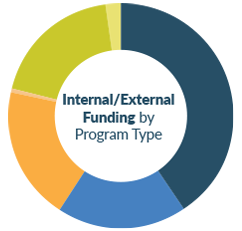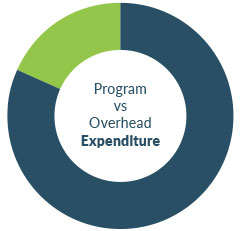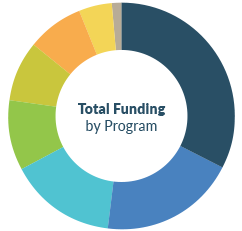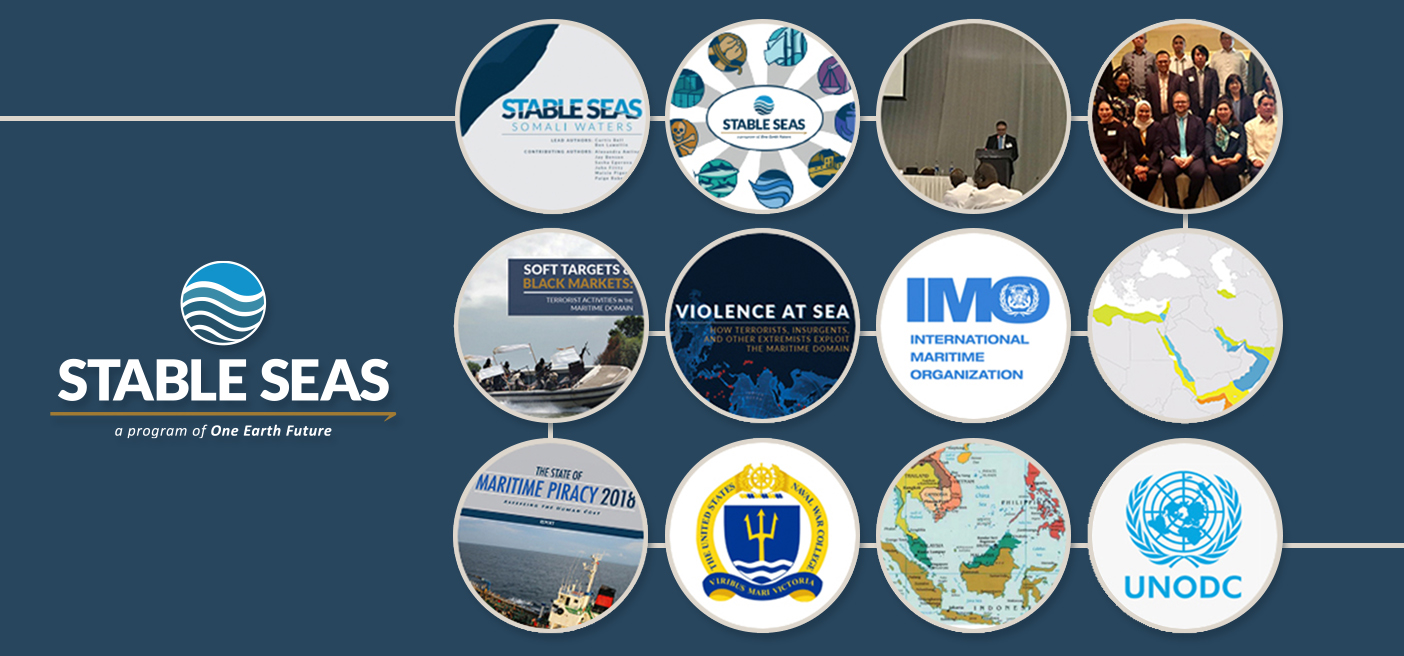A note from our Founder & CEO, Marcel Arsenault, and Executive Director & Chief Operating Officer, Jon Bellish
2020 was an extraordinary year. The Covid-19 pandemic forced everyone to change the way they worked, lived, and thought about the world around them. For OEF it was no different. We learned about the value of remote work, as well as its limitations. We invited each other into our homes through electronic media, seeing each other in ways that are more fully human. In the midst of a global shock, we saw how continued investment in economic development, good governance, womens’ full participation, and peaceful negotiation were more relevant and important than ever.
In 2020, the work of One Earth Future and our partners created thousands of jobs in Somalia and Colombia while measurably increasing trust levels between adversarial groups; established the first ever fisheries co-management associations in the Somali region; brought more open source data and design thinking into peace negotiations; and, designed the International Stability Operations Association’s first WPS Certification Program, with a dozen companies already certified.
OEF is committed to incubating peacebuilding and peacemaking programs to address the world’s toughest conflicts. We’re more serious than ever about the world actually getting to peace. And we understand that doing so will require a renewed and expanded obsession with both partnership and empirically-proven effectiveness at scale. Over the next three years, we plan to double down on these efforts to dramatically increase our reach and impact, proving our models further by doing it, systematically and with partners. Here’s how...
This means continuing to utilize OEF’s endowment as core support while increasing our levels of partnership with private donors and governments who are interested in collaborating with us to scale the proven impact our programs have demonstrated.
One Earth Future’s most significant impacts have been in working at the intersections of livelihoods and peace, building local to national governance networks, innovating in the field of Track 1.5 diplomacy, and strengthening the Women, Peace & Security (WPS) movement. Having acknowledged in 2020 that our comparative advantage in our large and diverse field does not lie in pure policy analysis, we reduced OEF Research, folded our data science and forecasting team into the Open Nuclear Network, and have handed off our Stable Seas program to a new institutional home.
Our most significant impacts toward peace have been at the intersections of livelihoods, local-to-national governance networks, Track 1.5 diplomacy innovations, and Women, Peace & Security initiatives. ”
2020 marked the 75th anniversary of the United Nations. During the three day 2020 Global Governance Forum OEF co-hosted in honor of the occasion, OEF’s leadership reaffirmed our belief that sustainable peace can only come through a new architecture that connects global issues and institutions to problem-solving on the ground.
As far as humanity may have come since the Second World War, the Covid-19 pandemic has shown us that this missing architecture is needed now more than ever. The good news is that, in the right environment, problems are “solution-seeking,” and our collective experience can form the sketches of a more reliable system for peace.
Over the past decade, OEF has shown that in concert with our network partners, we are moving the needle in this direction, creating sustainable livelihoods, building trust, and finding positive sum solutions in the midst of seemingly intractable conflict. We believe these are the basic ingredients for peace worldwide, and we remain committed to incubating solutions and scaling them—in partnership with communities, businesses, governments, and civil society—for decades to come.
This kind of persistence is necessary, given the extraordinarily complex problems we are facing. Our bet is that this persistence will pay off in the long run.
2020 Financials

- Grassroots Peacebuilding
- Internal | $4.8M
- External | $2.2M
- High Level Peacemaking
- Internal | $2.3M
- External | $63.5K
- Evidence-Based Practice
- Internal | $2.3M
- External | $231.9K

- Program Expenditure | $11.9M
- Overhead Expenditure | $2.6M

- PASO Colombia | $3.81M
- Shuraako | $2.26M
- Open Nuclear Network | $1.78M
- Our Secure Future | $1.18M
- Secure Fisheries | $1.01M
- Stable Seas | $934.7K
- XNI | $555.3K
- Forecasting | $134.3K
Key 2020 Scaling Partners








2020 Program Incubation & Impact
- Catalyzed New Markets
- Enabled New Livelihoods
- Measurably Increased Social Trust
- Proved Evidence of Scalable Model, Serving 4,000 Colombians
- Doubled Direct Investment for Somali Entrepreneurs to $18m
- Added $5m in Technical Assistance
- Provided Emergency Covid Relief
- Enabling Jobs & Economic Growth
- Engineered Open Source Data Tool to Reduce Nuclear Risk
- Built Diverse Team of Analysts
- Catalyzed Network of Diplomats
- Established Office in Vienna, Austria
- Established WPS Congressional Caucus
- Provided Technical Assistance to Policy Makers
- Established Office in Washington D.C.
- Pioneered Local-to-National Governance Linkages
- Established Skill-building School in Somaliland
- Piloted First Nation-wide Data Collection
Over the past several years, PASO Colombia has been working hand in hand with rural communities struggling to leave armed conflict behind. In doing so PASO has been partnering with them to perfect the ERA collaboration model, mobilizing local intelligence and resources, and connecting them to national and international institutional knowledge, capital, and markets. In 2020, PASO was able to adapt and scale-up this model, initially developed to support the collective reincorporation of FARC ex-combatants, and successfully apply it to promote sustainable rural development in the territories most affected by armed conflict, working with other actors like ex-coca growers and Venezuelan migrants.
In particular, PASO Colombia worked hand in hand with the Colombian government, and the UN Multipartner Trust Fund for Sustaining Peace in Colombia, to apply the ERA model to Colombia’s Integrated National Program for the Substitution of Illicitly Used Crops. This program, contemplated in part 4 of the peace agreement, was meant to support individuals voluntarily substituting coca crops for legal agricultural projects. Building on the ERA model, PASO Colombia was able to deliver results for over 4000 Colombians, building new markets and creating measurable improvements in social trust among participants. PASO Colombia is moving into 2021 confident in the knowledge that the ERA model can work at a significant scale to help build sustainable peace in rural Colombia, transforming the traditional logic of aid and turning the communities into active drivers of sustainable development in their own territories.

Shuraako continues to demonstrate that its model for bridging the institutional gap between western finance and Somali businesses and financial institutions is extremely valuable to development finance institutions around the world for its ability to foster sustainable economic opportunities in the Somali region. The trust that Shuraako has cultivated between Somali entrepreneurs and financial institutions within the Somali region and abroad was evident in the progress Shuraako made in scaling success in 2020.
The Nordic Horn of Africa Opportunities Fund raised $10.2 million in direct investment from Norwegian and Danish DFIs, bringing the Fund’s assets under management to $18.2 million. By placing these funds with credit-worthy businesses and systematically creating incentives for repayment, Shuraako is enabling sustainable economic growth and job creation throughout the region, each considered by One Earth Future to be cornerstones for peace. Shuraako raised an additional $5.0 million in technical assistance from Danida, the Danish Development Agency. This funding provided emergency relief to Shuraako’s portfolio investments due to Covid, as well as technical assistance to further bolster the Somali entrepreneurs working with Shuraako.

2020 was the first full year in operation for Open Nuclear Network, OEF’s newest program with the mission of leveraging open source data to reduce the risk of the inadvertent use of nuclear weapons. ONN was able to establish itself operationally, with offices in Vienna, Austria, and recruit a geographically diverse team of analysts. ONN also catalyzed its Engagement Network, a group of ten highly regarded former senior officials and experts; two each from China, Japan, Russia, South Korea and the United States, each of whom is known for his or her expertise in connection with the Korean conflict and has access to decision-makers in his/her respective countries. ONN hopes eventually to include members from the DPRK.
ONN published its analysis of the potential conflict escalation pathways on the Korean Peninsula, as well as the first ever code of ethics for open source intelligence (OSINT). By closely monitoring the conflict and potential negotiations on an ongoing basis, ONN’s aim is to put the right information into the right hands in time to make a difference, and create a shareable representation of reality in order to improve Track 1.5 diplomacy between North Korea, its neighbors, and the United States. ONN has positioned itself well in its first year to achieve its mission.
- Invited to brief a committee of the US Congress on OSINT and ONN's mission of conflict de-escalation by leveraging open source data analysis with its Engagement Network
- Invited by the UN Office of Disarmament Affairs to provide a brief on ONN's activities and offer its recommendations for conflict de-escalation on the Korean Peninsula and possible collaboration
- Established close working relationship with the IAEA's Department of Safeguards

Our Secure Future (OSF) was established in 2016 with the vision of creating peace through a stronger more equal security governance system. The program focuses on strengthening the Women, Peace and Security community of practice through technical assistance to policy makers, providing leading-edge research, and using the power of convening and networking multiple stakeholders to achieve better security outcomes. In 2020, the program opened its doors to the Our Secure Future office in Washington, D.C., with the main objective of supporting robust implementation of the US Government’s WPS Act of 2017 through the promotion of gender perspectives and the strengthening of the WPS community of practice.
OSF’s work in 2019 paid off in 2020 with the establishment of the WPS Congressional Caucus during the 116th Congress which had its official in-person launch the day before lockdown on March 9, 2020. The WPS Caucus has continued to gain membership and conduct virtual Congressional briefings. Technical assistance and strategic advising to senior level decision-makers at the National Security Council, Department of Defense, USAID, and the US State Department increased significantly. In addition, OSF formed new partnerships with the International Stability Operations Association, which resulted in OSF contributing to ISOA’s first WPS Certification Program for 125 companies. By the end of 2020, twelve participating companies received WPS certificates on completion of the ISOA requirements.
In the Somali region, unmanaged competition for natural resources like fisheries can create flashpoints for conflict. Secure Fisheries is working to solve this problem by improving local-to-national governance linkages via co-management associations (CMAs). CMAs serve as a central node for community collaboration and conflict management, business development, and communication with government entities and international organizations. In 2020, Secure Fisheries hit a major milestone in their model by successfully developing CMAs in their two pilot communities of Bander Beyla and Zeila.
The CMAs were created via agreements between the local leaders of fishing cooperatives, the local government, and the state Ministries of Fisheries and Marine Resources, the first of their kind in the Somali region. The CMAs have already begun to have positive impacts within the pilot communities and in neighboring communities, as Secure Fisheries continues to make the case for co-management as a model for the entire Somali region. Together with the Secure Fisheries program’s groundbreaking project to develop the first nation-wide database of fisheries catch, effort, and market data, the future is bright for Somali fisheries as a source of stability on the Horn of Africa.
- First Co-management Associations in the Somali region created
- Fishers Field School established in Somaliland
- Nation-wide data collection successfully piloted

Over the past several years, xNI has been working to codify the negotiation practices of top peace negotiation advisors like William Ury. The fruits of this effort can be found in the BB3 methodology, which helps negotiation advisers go to the Balcony to see the big picture, build the Bridges necessary to create positive sum outcomes, and mobilize the 3rd Side to help decision-makers choose peace.
xNI used the Covid crisis to enhance the scalability of its model, learning to implement BB3 virtually, and introducing a training model that maximizes the value of the remote technologies we have all been relying on over the past year. xNI hosted its first training cohort in 2020, and participants agreed that the tools and methodologies the team created were both practically useful and positively impactful.

Farewell to Stable Seas | A Tribute: Five Years of Sustained Impact To Date
At the end of April 2021 OEF’s Stable Seas program, in line with our approach to incubation, took on a life of its own to become an independent foundation, maintaining its focus on maritime security and continuing to work with stakeholders in the maritime sector around the world.
